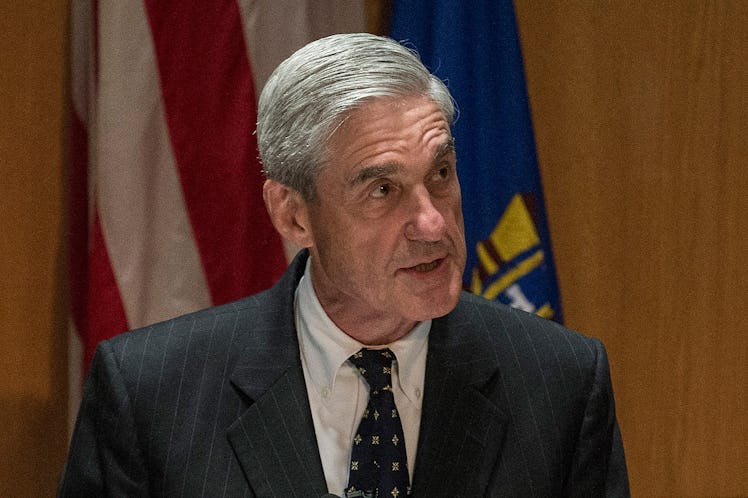
Russia Investigation Is Reportedly Looking To Cut Off Trump’s Pre-Emptive Pardon Options
On Oct. 3, we received yet another sign that U.S. special counsel Robert Mueller is likely preparing a criminal case in the Russia investigation into possible collusion with the Trump campaign, especially as experts start to worry about whether Trump can pardon his family and friends. Bloomberg profiled Michael Dreeben, a government lawyer with expertise in money laundering and foreign bribery and "more than 100 Supreme Court appearances" in his career.
And while usually this wouldn't be breaking news, Dreeben is special: he's Mueller's top legal counsel, and he is reportedly determining how to prevent pre-emptive pardons and create an air-tight case.
That is not a good sign for President Donald Trump, and it's yet another sign, after a summer chock-full of them, that the Russia investigation is closing in.
There is a strong possibility that Trump could try to use pardons to interfere in the investigation.
Mueller is reportedly concerned that Trump will use pre-emptive pardons to prevent Mueller's team from going after campaign members involved in possible collusion — including family members such as Donald Trump, Jr. and Jared Kushner, both of whom were present at a June 2016 meeting with Kremlin-connected Russian lawyers in Trump Tower. (Trump, Jr. received an email stating the lawyers were going to offer dirt on the Clinton campaign, to which he replied, "I love it.")
Mueller's fear is not unfounded — especially "now that current and former Trump advisers are under Mueller's scrutiny," per Bloomberg.
Trump has previously tweeted about what he believes is his "complete power" to pardon crimes—and he reportedly asked aides in late July whether or not he could use his pardoning to stymie Mueller's investigation. (Presidential pardoning, while broad, is not total.)
And several times throughout the summer, Trump has implied that he might try to use the presidential power to pardon in order to undercut Mueller's investigation.
According to NBC News, after Trump pardoned former Arizona Sheriff Joe Arpaio — a move which shocked and appalled many — experts started to wonder if he would try to use pre-emptive pardons in other instances, such as Mueller's Russia investigation.
Trump campaign members who may have been involved in the alleged collusion, such as former Campaign Chair Paul Manafort, could be the lynchpin that could connect Trump directly to alleged collusion, as well—incentivizing Trump to pardon them.
In July, Manafort's Alexandria, Virginia home was unexpectedly raided by the FBI — a sign that Mueller believed Manafort had sensitive documents that could help the investigation.
Trump's willingness to use his pardoning power is also the likely motivation behind Mueller's reported work with New York Attorney General Eric Schneiderman. Mueller and Schneiderman are reportedly looking into levying state laws in connection to the Russia investigation — likely due to the fact that president pardons don't extend to state crimes.
Enter Dreeben.
The government lawyer's presence likely shows that Mueller is exploring all of his options in this investigation — and that Mueller's investigation is closing in on the Trump campaign's alleged collusion with Russian agents in the 2016 presidential election.
In fact, only a few weeks ago, news broke that Mueller has requested documents directly related to some of Trump's actions, such as his involvement in writing a false statement to the press regarding Trump, Jr.'s 2016 meeting with Russian lawyers.
According to Bloomberg, Dreeben is "researching past pardons and determining what, if any, limits exist" and how best to create an air-tight case — a preventative measure against interference by Trump.
Essentially, Mueller's investigative team is trying to ensure an air-tight legal case, one that, were it necessary, Trump wouldn't be able to pardon his way — or his friends' ways — out of it.
This news comes on the same day that Senate Intelligence Committee has largely confirmed what the intelligence community has been saying for months: Russia created widespread campaigns to spread misinformation and interfere with the 2016 presidential election. North Carolina Senator Richard Burr, chairman of the committee, said that "the issue of collusion is still open."
Drip, drip, drip.